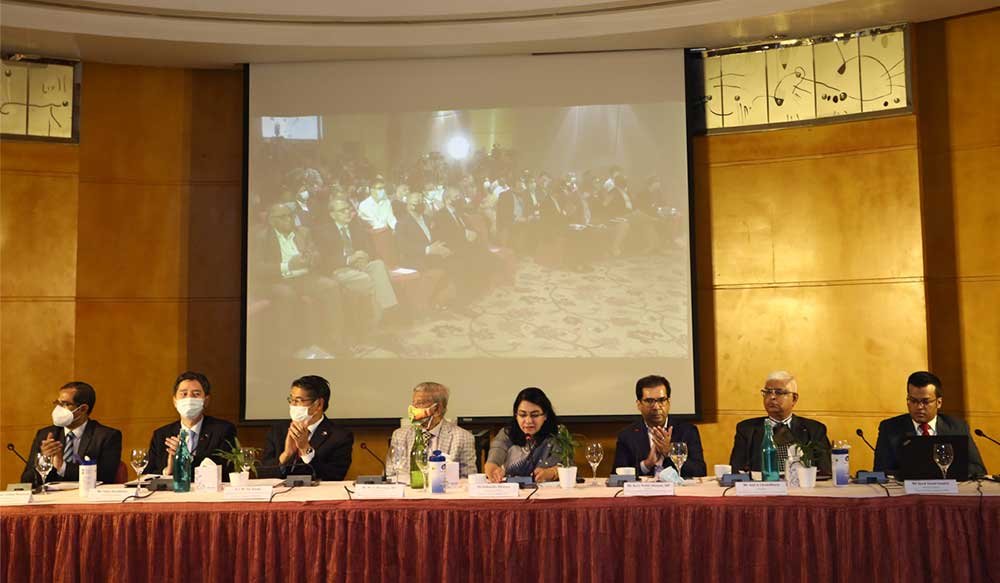
Bangladesh is presently undergoing a dual graduation: graduation from low-income country (LIC) to lower middle-income country (LMIC) and graduation from least developed country (LDC) to a developing country. Bangladesh is already facing less favourable terms on official development assistance (ODA) from most sources due to its LMIC graduation. LDC graduation is also anticipated to have significant impacts on Bangladesh’s major exports to Japan. During the course of its dual graduation, Bangladesh is also facing an uncertain future due to its low level of preparedness in dealing with the disruptions caused due to the fourth industrial revolution (4IR). As one of the most technologically advanced nations in the world, Japan’s experience and expertise may be useful for charting out a pathway for Bangladesh in the 4IR era so that Bangladesh may be able to successfully leverage technology to achieve its development objectives.
In this context, Centre for Policy Dialogue (CPD) undertook a research study titled “Bangladesh-Japan Partnership for the Next Development Journey” with a view to harnessing the emerging opportunities and celebrating the 50-year anniversary of the establishment of Bangladesh-Japan relationship. Based on this study, a dialogue was organised by CPD on Wednesday, 16 March 2022.
On behalf of the study team, Mr Syed Yusuf Saadat, Research Fellow of CPD, made the keynote presentation. He mentioned that the objectives of the study are: to review the trade relationship between Bangladesh and Japan in the past five decades; to evaluate the Japanese ODA to Bangladesh and Japanese FDI in Bangladesh; and to understand how Japan may support Bangladesh in its next development journey during the 4IR and beyond dual graduation.
The study showed that Japan is one of Bangladesh’s top trading partners, besides the United States of America (USA) and the European Union (EU). Bangladesh’s readymade garment (RMG) and textile exports started entering the Japanese market since 1972. Over the years, large volumes of apparel and RMG goods have been exported to Japan which account for about 83 per cent of Bangladesh’s total exports to Japan. The foreign aid provided by Japan to Bangladesh has been increasing since 1972. In 2021, Japan disbursed USD 1.95 billion as aid to Bangladesh, which was the highest in the last 50 years. Focusing on some challenges as well as opportunities, the study further illustrated that production capacity for the domestic market in Bangladesh can be increased greatly through increased economic cooperation between Bangladesh and Japan.
The study put forward several recommendations, including—to increase economic diversification, skills and productivity; to expedite technological adoption to be more efficient and stay competitive; to work for better bilateral cooperation through higher investment in technology, physical and soft infrastructure and by strengthening trade and financial integration; to meet Japanese standards in terms of manufacturing; to consider negotiating for a 3-year smooth transition period for Bangladesh from 2026 to 2029, during which Japan will continue to offer LDC-specific support measures to Bangladesh; to conduct trade talk with Japan and expeditiously sign a bilateral trading agreement; construct a bridge that connects to the mainland to facilitate the smooth circulation of people and materials around the Japanese Economic Zone; to expand the capacity of rail dependent supply chains between the nodes of Dhaka and Chittagong; to mechanise freight forwarding facilities; to reform Bangladesh’s educational system by including the development of vocational skills and to concentrate on higher education on STEM subjects; to emphasise the exchange of knowledge between Bangladesh and Japan through joint research between universities; and to invest more on research and development (R&D).
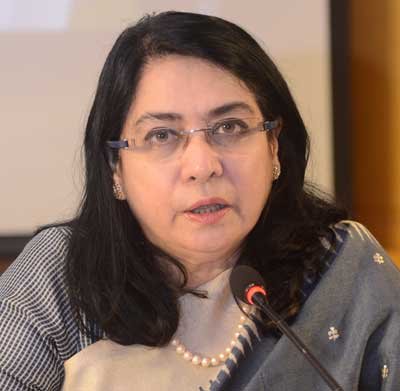
The dialogue was moderated by Dr Fahmida Khatun, Executive Director, CPD. In her welcome remarks, Dr Fahmida said that the Japan-Bangladesh diplomatic relationship has been expanded and strengthened over the years on various fronts, especially economic fronts, through trade, investment, foreign assistance and technological cooperation. Japan is a leading bilateral development partner of Bangladesh. Japan’s constant support has contributed to Bangladesh’s development process vividly—through investing in health and education, developing infrastructures, and reducing vulnerability to name a few. She mentioned, “As Bangladesh is now moving forward after five decades of its journey, it is facing new dynamics in terms of both opportunities and challenges”. The bilateral partnership is now more crucial than ever since Bangladesh is aspiring for graduation from low-income country to middle-income country, and from LDC to developing country status. Apart from the perennial challenges of combating the pandemic, there are other challenges such as preparing for 4IR. Exploiting the full benefits of the 4IR requires huge financial investment and resource mobilisation, where countries like Japan can come forward. Besides, she emphasised an enhanced trade collaboration, especially in terms of Bangladesh’s access to a higher-level of RMG market. Considering that the scope of strengthening the Bangladesh-Japan relationship are manifold, this event aims to chart out some ways forward.
The dialogue was chaired by Professor Rehman Sobhan, Founding Chairman of CPD. Professor Sobhan shared his experience of visiting Japan back in 1959, as a member of trade delegation representing the then East Pakistan. He recalled his visit as an eye-opening experience, because Japan made a miraculous recovery in the post-war phase where a completely war-devastated country had emerged as one of the major emerging economic powers in the world. He further stated that some of the major industries located in the then East Pakistan were set up through Japanese aid, making Japan Bangladesh’s leading development partner in the pre-liberation period. Professor Sobhan remarked that, as an emerging Asian economy, it is important for Bangladesh to plug into the networks established by Japan. He opined that it is not enough for Bangladesh to establish its first footprints as an RMG exporter; it is also important for Bangladesh to become a source of Japanese investment in the manufacturing sector with a target for the Asian, the Japanese and the global market. He mentioned that it is necessary to upgrade the investments from Japan and to invest in the value chains, in the same manner in which Japan had elevated their relationships with China and with the ASEAN countries.
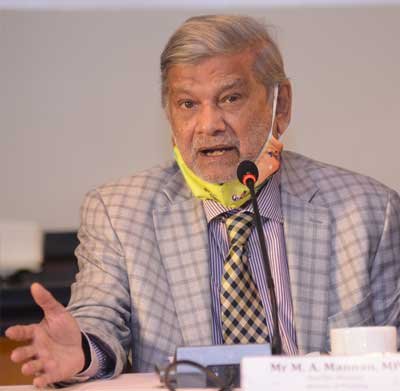
Mr M A Mannan, MP, Hon’ble Minister for Planning, Government of Bangladesh graced the dialogue as the Chief Guest. He acknowledged the cooperation of Japan International Cooperation Agency (JICA) particularly in infrastructure development. Following the devastating cyclone in the 1970, Japan was one of the first countries who extended support to Bangladesh. Setting a positive tone, he said that both countries had been consistently friendly and warm in almost all matters throughout the 50 years of the bilateral relationship. “Our government believes in true and substantial economic development, and we want the strong bond of friendship to continue in the coming days.” Hence, he urged that both countries would need to work together for win-win outcomes for both. He said that a draft Free Trade Agreement (FTA) between Bangladesh and Japan is currently being developed. He expressed hope that an FTA between Bangladesh and Japan would be signed soon. He assured that the government will work towards making the next 50 years of Bangladesh-Japan partnership “better, stronger and warmer”; and this CPD dialogue will help the government view the bilateral relationship in a better light.
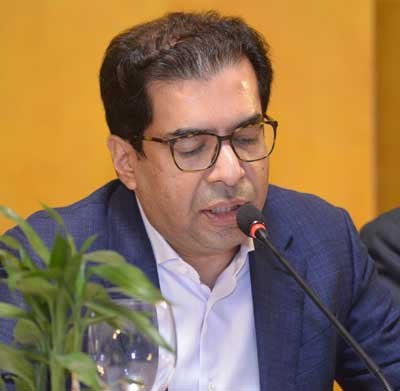
Mr Kazi Nabil Ahmed, MP, Member, Parliamentary Standing Committee on Ministry of Foreign Affairs, Government of the People’s Republic of Bangladesh was the Special Guest of the dialogue. He commented that the dialogue arranged by CPD is very timely. He said that Japan has been a true friend of Bangladesh in every sense even before Bangladesh’s independence, remaining one of Bangladesh’s earliest partners, especially in trade and commerce. Considering the implications of next development journey for the two countries, Bangladesh will not be able to reap benefits from the evolving scenario if it is not ready to cope with and take advantage of the demographic change in the Japanese workforce. He called for a much bigger workforce in Bangladesh to be trained and be completely attuned to the technological skills required to work in Japan. As for the 4IR, the Bangladeshi manufacturing industries are facing shortage of qualified workers, and so Bangladesh can take advantage of the knowledge of the Japanese partners in academia, business and research, since Japan is one of the most technologically advanced countries in the world. He remarked that this 50-year partnership occasion calls for a high-level visit from both countries.
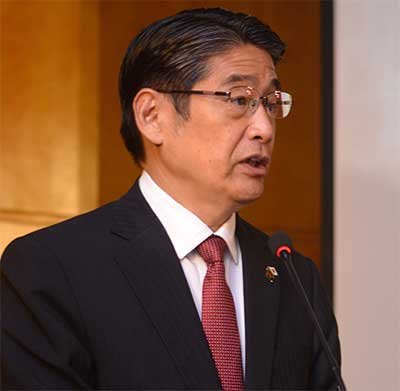
His Excellency Mr ITO Naoki, Ambassador Extraordinary and Plenipotentiary Embassy of Japan in Bangladesh, was the Guest of Honour. He remarked that this CPD dialogue is one of the events to mark and celebrate the 50th anniversary of Bangladesh-Japan friendship. He added that the economic cooperation between Bangladesh and Japan has been remarkable. Investment from Japan has more than tripled in the last 10 years, notwithstanding the Holy Artisan terror attack and the COVID pandemic. According to the recent JETRO survey, 68 per cent of Japanese companies are ready to expand their business operations in the coming two years. Congratulating Bangladesh on its vision 2041 and its upcoming graduation from the LDC category, and hoping that the bilateral trade and investment would expand further, H E Naoki said, “The country may need to cope with the emerging new challenges, and industries must be diversified.” He opined that introducing new technologies is necessary for productivity growth, and workforce skills development. He mentioned that young and talented Bangladesh should be ahead of the curve of innovation.
H E Naoki added, “I believe that the expansion of Japanese FDIs particularly from the private sector will help Bangladesh address those challenges. Increasing the FDI-GDP ratio is critical, and to attain that, we expect to further progress in ease of doing business.” He emphasised the need for constant regulatory and structured reforms. He called for Bangladeshi government’s intervention on issues facing Japanese companies in Bangladesh including delays in customs clearance, various taxations, restrictions on telegraphic transfer in import payments, discrimination in export incentives, and improvement of business environment in EPZs and SEZs (special economic zones). He expressed hope that this engaging discussion would help chalk out ways for both countries to further develop the bilateral relationship based on win-win outcomes. H E Naoki also expressed concern about the crisis in Ukraine, and emphasised that peace is of utmost importance for the stable development and economic growth of all countries.
His Excellency Mr Shahabuddin Ahmed, Ambassador Extraordinary and Plenipotentiary, Embassy of Bangladesh in Japan, the Guest of Honour, opined that this dialogue is particularly important to highlight how the Bangladesh-Japan collaboration could be taken forward in light of 4IR and LDC graduation. He said that the golden jubilee of the Bangladesh-Japan friendship is an occasion to celebrate the long-established relationship of solidarity, trust and understanding, and to focus on various issues of mutual concern. Over the years, the continued growth of trade and economic cooperation made Japan a reliable partner in Bangladesh’s development endeavours and a leading export destination for Bangladesh in Asia. “Although the volume of bilateral trade is yet to reach full potential, there is a huge opportunity as Bangladesh is pursuing liberal investment policies, and offers fiscal and non-fiscal incentives, strategic location, competitive workforce, large domestic market and quality export products for Japan,” said H E Shahabuddin Ahmed. He then shed light on a number of significant issues, such as—bringing skilled manpower from Bangladesh to Japan, making arrangements for bilateral trade agreement post LDC graduation, increasing FDI inflow, and increasing regional and global connectivity.
Ms Kathy Matsui, Board Member, Asian University for Women, and General Partner, MPower Partners, said that both economies have complementary characteristics opening up scope for mutual benefits for the two countries. She emphasised investment in education, women’s participation in the labour market, and gender diversity.
Dr Tatsufumi Yamagata, Professor, College of Asia Pacific Studies, Ritsumeikan Asia Pacific University, shed light on how to vitalise the Bangladesh-Japan relationship in the next decade. He mentioned that the Rana Plaza accident, Holy Artisan terror attack, and the COVID-19 pandemic all posed challenges to Japanese investment in Bangladesh. He added that publicising Bangladesh’s achievements on economic and social fronts to the Japanese people would be a key to vitalise the bilateral partnership.
Dr Khondaker Golam Moazzem, Research Director, CPD said that Japan is always ahead of the curve in terms of bilateral partnership. He thanked the government of Japan for providing a scholarship which allowed him to pursue his PhD at the Kyoto University, and added that such opportunities should continue to be provided so that young Bangladesh may seek higher education in Japanese universities and contribute to the development of Bangladesh upon completion of their studies. He mentioned that the partnership between Bangladesh and Japan should now be viewed from a new angle in the context of Bangladesh’s upcoming LDC graduation. He urged for a broader economic partnership between Bangladesh and Japan, not only in terms of goods trade, but also in terms of services trade and foreign investment.
Dr Kenta Goto, Professor, Faculty of Economics, Kansai University said that linkage between Bangladeshi businesses and their Japanese counterparts can open opportunities to enhance skills or knowledge through local training institutes, or more broadly, through national innovation systems. Echoing Professor Yamagata, he remarked that factors like the Rana Plaza accident can set back business prospects.
Mr Hayakawa Yuho, Chief Representative, JICA Bangladesh Office, highlighted some significant investment projects of JICA in Bangladesh. He said that the role of Japan is now changing from providing funds and technology to catalytic function such as mobilising external finance especially from the private sector. How to unleash the enormous opportunities and resources of private sectors is a key to the promotion of FDI and improvement of business environment. He further hoped for a more mutual bilateral relationship in future, and Bangladeshi policies need to be attuned to that.
Mr Asif A Chowdhury, President, Japan-Bangladesh Chamber of Commerce and Industry (JBCCI), said that Bangladesh has to act promptly to sign a FTA with Japan, as it is moving towards graduating from the LDC category. He emphasised improving the ease of doing business through enhancing the efficiency of government agencies and strengthening the good governance of institutions.
The event was followed by an intriguing open-floor discussion. High-level policymakers, diplomats, foreign delegates, researchers, development practitioners, academics, business leaders, civil society representatives, international development partners, and journalists participated in the dialogue.


